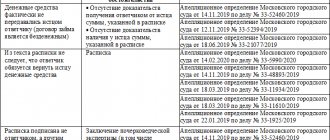A loan agreement is an agreement that describes the mutual rights and obligations between the lender and the borrower that arise when transferring money or any type of goods into management or ownership for a period specified in the agreement. Thus, the essence of any loan or credit agreement is the assignment by one of the parties to the agreement of any material assets to the other party on the terms of returning their value after a period of time specified by the terms of the agreement.
Debt collection under a loan agreement
Debt collection is carried out in one of two ways:
- Under administrative compulsion (application under Articles of the Criminal Code of the Russian Federation No. 159, 176 and 177).
- Through legal proceedings (a claim for collection is filed at the place of registration of the person who received the loan).
In this case, it is recommended to file a petition so that the debtor’s property is seized (this excludes the situation when the borrower sells or donates his property to third parties). When collecting a debt through the court, not only the entire amount of the debt is charged, but also a penalty - it is calculated based on the loan agreement or the Civil Code of the Russian Federation.
Judicial coercion is formalized as follows: an application is sent to the court authorities, which requires the issuance of a court order. The application is then considered by either a magistrate or a district court.
We agree without court
Contact the debtor and agree on an installment plan, postponing payment for a certain period, after which you intend to file a lawsuit and contact law enforcement agencies.
For example, if the amount of debt is more than 2.5 million rubles and it is known that the debtor has money in his accounts and valuable property, including luxury items, but he deliberately evades repayment of the debt, then such behavior falls under the signs of malicious evasion of debt repayment (Article 171 of the Criminal Code of the Russian Federation).
How to win a court case under a loan agreement?
Winning a lawsuit in favor of the borrower is possible if the borrower can prove the fact of repayment of funds. Likewise, the lender can win in court if he proves the fact of transferring money or property on loan. If a dispute arose between two individuals, then to prove the transfer of an amount less than 10 minimum wages, the testimony of two witnesses is sufficient. If the amount is greater than the specified amount, then the court has the right to refuse to satisfy the lender’s interests, since he was obliged to draw up an agreement or take a receipt (written evidence of the formation of the loan).
The loan agreement can also be challenged due to lack of funds - thus, the borrower can prove that valuables or funds were never transferred by the lender in full.
It is important to consider that even a written agreement can be challenged by the borrower with the help of witnesses if the loan agreement was concluded under threat, under difficult circumstances, through deception or violence. You must contact the appropriate authority within the limitation period of such an agreement (3 years).
Collecting evidence of debt
Without evidence of the existence of a debt (loan agreement), collection of debts from individuals is impossible, unless the debtor pays off voluntarily.
What can be evidence of debt :
- loan agreement (or other agreement under which the debt arose;
- receipt.
A correctly executed loan agreement or receipt will be indisputable evidence for the court. These documents must contain the loan amount, terms and procedure for repayment, confirmation of receipt of cash by the borrower.
If the agreement was concluded remotely over the Internet by signing documents by entering codes received by the borrower on the phone, such an agreement also has legal force.
In addition, if there is no agreement, as evidence the court accepts witness testimony, primary documents and payment documents, as well as correspondence by e-mail, SMS, messaging in instant messengers and social networks, certified by a notary, video and audio recordings.
Statement of claim for debt collection under a loan agreement
The statement of claim is sent (under Article 22 of the Code of Civil Procedure) to a court of general jurisdiction. If the parties to the agreement are a legal entity or individual entrepreneur, it is sent to the Arbitration Court. The price of the claim plays a role (less than 50 thousand rubles - to the magistrate). The statement of claim is sent to the place of registration of the defendant, or to another institution, if it is specified in the contract. The statement of claim must include evidence of the debt (agreement, receipt, oral agreement).
Among the claims there are options:
- Under a loan agreement or receipt. You may not indicate the circumstances of the transfer of money.
- Similarly, but with demands for recovery of not only the debt, but also interest - for the use of funds that do not belong to the defendant.
- The statement of claim filed by the employer upon termination of the loan agreement is different. Funds are most often collected from the employee by deduction from salary.
- Statement of claim for legal entities and individual entrepreneurs (when submitted to the arbitration court).
Advice to Sravni.ru: According to clause 1 of Art. 811 of the Civil Code, a borrower who does not repay the loan within the terms specified in the agreement is obliged to pay interest on the use of funds. Their size is determined by clause 1 of Art. 395 of the Code. These interests are paid regardless of the basic ones, if they were specified in the agreement (according to paragraph 1 of Article 809).
Disputes in the field of lending and issuing loans
Disputes in the field of lending and issuing loans in the practice of the Arbitration Court make up a significant part of all claims to the arbitration institution. In general, claims under such agreements arise due to untimely repayment of loans or late payments of interest under the agreement. Thanks to the regular practice of considering claims under debt collection agreements under loan agreements, the professionalism and experience of the judicial staff of the arbitration institution, decisions on claims are made in the shortest possible time, while maintaining a low level of the total amount of legal costs. This allows you to obtain a writ of execution and recover property from the debtor by the FSSP of the Russian Federation, before the debtor manages to withdraw it or sell it. Also, unlike state courts, the arbitration institution of the Arbitration Court satisfies all claims for payment of penalties and interest under contracts.
An analysis of the existing judicial practice of an arbitration institution shows that more than twenty percent of debtors return material assets after receiving a ruling to consider the case in court. And up to 36 percent of the total - after the decision is made and the debtor familiarizes himself with the decision of the arbitration institution. Borrowers under such agreements should remember that the outstanding debt when sold under assignment agreements increases in price by up to 500%.
We send a pre-trial claim
A pre-trial claim indicates the seriousness of your intention to go to court, and may encourage you to repay the debt (or part of the debt). We provide a written justification for the requirements with references to the provisions of the law, calculation of the debt with interest and fines. We attach evidence to the claim.
Important! Warn the debtor that if you go to court, in addition to the principal debt, interest and fines, you will be charged a state fee, all court costs and legal expenses.
It is not necessary by law to send a pre-trial claim to a debtor-individual, with the exception of 2 cases:
- when a provision for pre-trial procedure is in the agreement (receipt);
- if the agreement (receipt) does not indicate the exact loan repayment period.
If you have written a pre-trial claim, you need to wait 30 days for a response or translation, and then file a claim (Article 810 of the Civil Code of the Russian Federation). Has the debtor failed to comply within 30 days? You can go to court.
We will help you repay your debt
Debt recovery is a legally complex procedure, especially if the debtor categorically refuses to return the funds. Alfagroup lawyers are ready to come to your aid and return your money, using all legal means of influencing an unscrupulous borrower. Our company employs only professionals who have experience in debt collection and participation in litigation of this kind.
Before we begin working on the return of your funds, we need to evaluate the documents you have that confirm the borrower’s debt obligations - receipts, payment orders, account statements, receipts, loan agreement. How to repay the debt, and whether the probability of repayment is high, our specialists will answer after a detailed analysis of the factual evidence you provided.
We use “new” methods of debt collection from individuals
Courts are increasingly accepting “technological” evidence: correspondence, photos and videos on social networks, screenshots. So, in one case of debt collection in bankruptcy, a girl published photos on social networks with a car that she officially sold shortly before she took on the debt. The financial manager saw on VKontakte that after the sale of the car, the debtor continued to use the foreign car, confirmed this with screenshots and challenged the transaction.
This example of a debt collection case shows how modern technology has expanded the ability to obtain evidence. It is enough to show persistence and ingenuity.
When giving a loan, you asked an acquaintance (comrade, friend) for a receipt. It's time to pay, but the money still hasn't been returned? It's time to act.
You only have a receipt, there is no loan agreement. You are overcome with doubts. Away with them. In accordance with paragraph 2 of Art. 808 of the Civil Code of the Russian Federation, in confirmation of the loan agreement and its terms, a receipt from the borrower or another document certifying the transfer by the lender of a certain amount of money or a certain number of things to him may be presented. It turns out that the loan agreement is a real contract and, unlike a consensual one, is considered concluded from the moment certain actions are performed, in this case, the transfer of funds from the creditor to the debtor. Thus, you have legal grounds to collect the borrowed amount. The only question is how to do it.
The answer is obvious. If, in accordance with the terms of the agreement (yes, exactly the agreement, since the receipt is confirmation of the conclusion of the loan agreement), the debtor does not fulfill monetary obligations, the creditor has the right to collect them through the court. Before filing a lawsuit, you can write a claim to the debtor for the return of a monetary debt. However, in accordance with the Civil Code of the Russian Federation, this is not necessary. There is no claim procedure for the loan agreement.
A penalty under a loan agreement can be recovered even if it is not indicated in the receipt (in the agreement). In accordance with Art. 809 of the Civil Code of the Russian Federation, unless otherwise provided by law or the loan agreement, the lender has the right to receive interest from the borrower on the loan amount in the amount and in the manner specified in the agreement. If there is no provision in the agreement on the amount of interest, their amount is determined by the existing bank interest rate (refinancing rate) at the place of residence of the lender, and if the lender is a legal entity, at its location on the day the borrower pays the amount of the debt or its corresponding part.
A statement of claim is filed in court to collect the debt under the loan agreement (receipt). Before submitting a claim for debt collection, you must pay the state fee in accordance with Chapter 25.3 of the Tax Code of the Russian Federation. It will depend on the size of the claim.
The most important thing in court is to prove the very fact of transfer of funds.
If the receipt or agreement provides for a penalty, then it is worth noting that the court often reduces the amount of the penalty to the refinancing rate or to a lesser extent (Article 333 of the Civil Code of the Russian Federation), if this penalty significantly exceeds the losses received by the creditor. Therefore, evidence of infliction of certain losses will be of great importance for the court.
A loan agreement can be concluded both between individuals and between legal entities. Therefore, it is worth immediately understanding that if an individual is involved in the agreement (at least on one side), then the case is under the jurisdiction of a court of general jurisdiction, but if both parties to the loan agreement are legal entities, then the case is under the jurisdiction of an arbitration court. It is also worth paying attention to territorial jurisdiction and remember the general rule of jurisdiction: the statement of claim is filed at the location of the defendant.
By the way, the defendant cannot always be only the debtor under the contract. In accordance with current legislation, persons may apply to the court for restoration of violated rights. And the creditor can also violate rights. He may illegally retain property belonging to the debtor, but in the possession of the creditor, demanding the payment of excessive fines. These claims will have to be challenged in court.
Delay in fulfilling obligations under a loan agreement (receipt) is also possible due to the fault of the creditor, when the latter hides from the debtor in order to receive penalties, etc.
It is very important when filing a claim to collect a debt against a receipt not to submit the original documents to the court and not to attach them to the case materials. It is advisable to submit copies of documents, but carry the originals with you for the court: the court can familiarize themselves with them, certify and return them. This will protect you from various kinds of excesses: court employees are people too and can lose important documents. And if the other party to the dispute has doubts about the authenticity of the document, an examination will have to be carried out, which is only possible if the original documents are available.
| See on the topic: - How to sue? — How to determine the cost of a claim? — Filing a claim — Collection of alimony |





